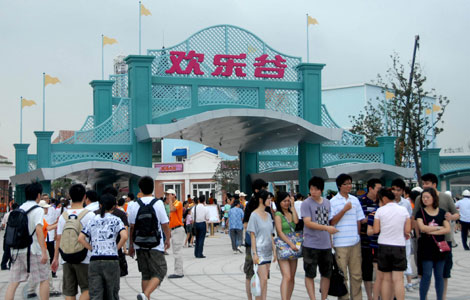Economy
Shanghai hopes to become int'l tourism hub
Updated: 2011-02-24 07:51
By Shi Yingying (China Daily)
|
Given Shanghai's ambitious target for its tourism industry, Disneyland and the second phase of Happy Valley (above), a local theme park, will be two important construction projects for the city. Yang Yi / for China Daily |
SHANGHAI - Shanghai, China's financial and business center, plans to build itself into an international tourism destination and is setting the goal of increasing revenue from tourism by 70 percent within five years.
Revenue from tourism totaled 305.3 billion yuan ($46.4 billion) in 2010, a 30 percent increase over the previous year, according to figures from the Shanghai Tourism Industry Development Conference.
By 2015, however, it hopes to generate 520 billion yuan annually, a 70 percent jump compared with 2010. The city aims to attract 240 million domestic and 10 million foreign visitors by 2015.
Shanghai wants to develop tourism into a strategic industry, expecting it to create 300,000 jobs and contribute 8.5 percent to the city's GDP by 2015, said Yu Zhengsheng, head of the Shanghai Municipal Committee of the Communist Party of China, at the conference.
Local media reported that the municipal government will invest more than 40 billion yuan in 13 municipal-level tourism projects, including a planned Disneyland theme park, over the next five years.
"Disneyland and the second phase of Happy Valley will be the two most important construction projects in the next few years," said Shanghai Vice-Mayor Zhao Wen.
However, Zhao Huanyan, a tourism industry expert from the Shanghai Academy of Social Sciences, believes that the investment in Disneyland, along with associated supporting projects, will exceed the 40-billion-yuan mark reported by local media.
"The investment for constructing Disneyland and its nearby resorts will be more than 100 billion yuan, not including operating costs. I expect the total investment will be more than what we paid for Expo 2010 Shanghai," Zhao said. "Local government will pay most of it."
Zhao also said the city's tourism revenue goal for 2015 might be too high. "Last year, Shanghai's tourism revenue contributed 19 percent of the national (tourism) revenue because of the Expo, but such a high contribution isn't necessarily going to be sustainable," said Zhao. "The 520-billion-yuan revenue target will be difficult to achieve."
Involving investment of more than 1.8 billion yuan, a 85,000-square-meter artificial indoor beach in southern Shanghai's Fengxian district is another project that falls in line with the city's five-year plan.
"The idea is that we want to build an indoor beach that welcomes people year-round instead of seasonally," said Wang Sihai, general manager of Shanghai Bihaijinsha Investment and Development Co Ltd.
"We found an investor last year, but the project has been held up because the government wants to develop the whole region, which requires the addition of more commercial plans," he said. "The investor will be working with the local government on the project, and the details of the plan will be worked out by the second half of this year."
In addition to plans for a suburban theme park and beach resort, Shanghai intends to focus on developing its downtown district as a Meeting, Incentive, Conference and Exhibition (MICE) destination and an international shopping center.
"In the wake of the Expo, Shanghai plans to turn itself into a famous international MICE destination," said Chen Meihong, vice-director of the Shanghai Municipal Tourism Administration. "The tourism industry will benefit from the relatively young but growing business as part of the post-Expo effect."
Adding to the collection of large-scale conference venues, such as the Shanghai Exhibition Center and the Shanghai International Convention Center, the 140,000-square-meter Expo Center, complete with a rooftop helicopter pad, will remain as a permanent fixture of the Expo site. The Shanghai Congress and Shanghai Political Consultative Conference were held there last month.
The city is also working on applying for a tax-rebate policy - like the one implemented on the southern island of Hainan - to benefit foreign travelers and visitors from Taiwan, Hong Kong and Macao.
In Haikou and Sanya's three appointed shopping malls, visitors leaving the island who have spent more than 800 yuan will be eligible for a tax rebate of up to 11 percent.
"We don't see why we can't get approval too, after Beijing said 'yes' to Hainan," said Chen Yuxian, deputy head of the Industry Supervision Department of the Shanghai Municipal Commission of Commerce.
China Daily
(China Daily 02/24/2011 page16)
E-paper

Online shops boom in China
Low investment, quick returns offer profit-making opportunities for struggling students.
Something 'fishy' about this trick
Banking on success
Branded outlets move in
Specials

The green lantern
Environmental concerns are shedding new light on a colorful tradition

Inland interchange
Chongqing bets on its position as a hub for China's west.

Zooming in on Chinese skies
Helicopter companies ride on country's growing interest in luxury aviation.

